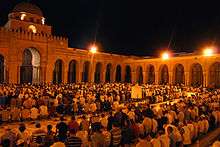Tarawih
| Part of a series on |
| Islamic jurisprudence (fiqh) |
|---|
| Islamic studies |

Tarawih (Arabic: تراويح) refers to extra prayers performed by Sunni Muslims at night in the Islamic month of Ramadan.
Name variations
- Acehnese: Seumayang Teurawèh
- Albanian: Namazi i teravive
- Arabic: صلاة التراويح, translit. Ṣalāt al-Tarāwīḥ
- Azerbaijani: Təravih namazı
- Bengali: তারাবীহ, translit. Tarabeeh
- Indonesian, Malay, Javanese: Salat tarawih, Solat tarawih
- Persian, Dari: نماز تراويح
- Serbo-Croatian, Bosnian: Teravih-namaz; Teravija
- Somali: Salaada Taraawiixda
- Sundanese: Tarawéh
- Turkish: Terâvih namazı
- Urdu: نماز تراويح, translit. Namāz Tarāvīḥ
- Uzbek: Tarovih namozi
Overview
Tarawih prayers are prayed in pairs of two and can be prayed in at least 08/12/20 raka‘āt according to the Hanafi and Shafi'i schools of Sunni Islam. A break is taken after every 4(2+2) raka‘āt. This prayer is performed only during Ramadan of the Islamic calendar after salat of Isha the last Tarawih prayers from moon-sighted evening (Start) to last day of Ramadan . Sunni Muslims believe it is customary to attempt a khatm "complete recitation" of the Quran as one of the religious observances of Ramadan by reciting at least one juz' per night in tarawih. Tarawih prayers are considered optional, not obligatory.
Background
The Sunni prayer Tarawih has been mentioned in traditions as Qiyamul Layl min Ramadan ("Standing of night in Ramadan") and Qiyam-ar-Ramadan ("Standing of Ramadan"). Some Sunni Muslims regard the Tarawih prayers as Sunnat Mu'akkadah. Other Sunni Muslims believe Tarawih is an optional prayer that may be performed at home. According to this tradition, Muhammad initially and briefly prayed the Tarawih in congregation during Ramadan, but discontinued this practice out of fear it would be mandated yet never forbade it.[1] During the time when Umar was the caliph, he reinstated the praying of Tarawih in congregation.[2]
Alevi, Twelver and Isma'ili Muslims regard Tarawih as bid‘ah, introduced after the death of Muhammad.[3] Instead, Twelvers believe in the Tahajjud prayer or Salat al-Layl ("night prayer"), which is recommended throughout the year, especially during the nights of Ramadan.[4]
Notes
- ↑ "The Book of Prayer - Travellers". Book 4, Hadith 1663. Sahih Muslim. Retrieved September 1, 2015.
- ↑ "Praying at Night in Ramadaan (Taraweeh)". Book 32, Hadith 227. Sahih Bukhari. Retrieved September 1, 2015.
- ↑ "Praying at Night in Ramadaan (Taraweeh)". Book 31, Hadith 3. Sahih al-Bukhari. Retrieved September 1, 2015.
- ↑ "Imam Ali Foundation - Ramadhan Moon Crescent 1436". Archived from the original on June 17, 2015.
References
- John L. Esposito: The Oxford Dictionary of Islam. Oxford University Press US 2004, ISBN 978-0-19-512559-7, p. 276 (restricted online version, p. 276, at Google Books)
External links
| Wikimedia Commons has media related to Tarawih. |

